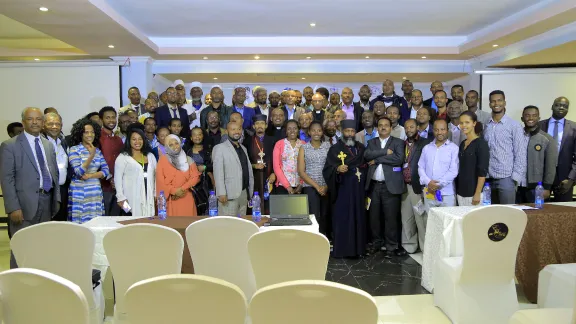
Participants during the October 2018 training of trainersâ workshop in Ethiopiaâs capital Addis Ababa. On the far left, front row, is former EECMY president, Rev. Dr Wakseyoum Idosa, who coordinates the peace project. Photo: EECMY
Ethiopia’s church-led initiative builds trust among religions and community members
(LWI) - Faith leaders are becoming agents of peaceful religious co-existence and stemming potential sectarian conflicts in Ethiopia, thanks to a peace project of The Lutheran World Federation (LWF) and the Ethiopian Evangelical Church Mekane Yesus (EECMY) focusing on three of the Sustainable Development Goals (SDGs).
Dr Ojot Miru Ojulu, LWF’s LWF Assistant General Secretary for International Affairs and Human Rights, who accompanies the project, noted it “has galvanized the voice of religious leaders to stand for peace and defend the human rights of every citizen as the country endeavors to transition towards democracy and rule of law.”
He said Ethiopia had embarked on political transformations towards democracy and peace, but significant challenges remain. “The LWF works with its member church, the EECMY, in collaboration with the Inter-Religious Council of Ethiopia to empower religious leaders to contribute their part toward reconciliation and peaceful coexistence,” he added.
Building trust to promote peace
Funded by the Norwegian Agency for Development Cooperation (Norad) and implemented by the EECMY Peace Commission Office, the initiative which “started with strong approval from the community” has “built trust among various stakeholders to work together on promoting peace,” a May 2019 progress report states.
The two-year project supports the church’s ongoing diaconal work to promote interreligious tolerance through dialogue (SDG 16), incorporates gender equality as a cross-cutting issue (SDG 5) and promotes multi-stakeholder partnerships (SDG 17). It was launched in June 2018 in Begi district in the Oromia Regional State, during a workshop attended by 41 faith representatives, traditional leaders and government officials.
“This foundation helped the project to continue to work in this area under extreme security difficulties because all relevant stakeholders know about it and they know it is the right thing to do for the wellbeing of their respective communities,” the report notes.
A training of trainers (ToT) workshop for religious leaders on Peaceful Conflict Resolution and Management was held in October 2018 followed by a conference co-organized by the Inter-Religious Council of Ethiopia (IRCE) and EECMY in the capital Addis Ababa in December. The televised peace conference gave 200 religious leaders, academics and civil society members an opportunity to bring a message of peace to the nation of 105 million people. According to the latest national census, Christians make up 62.8 percent of Ethiopia’s population, Muslims represent 33.9 percent, and the remaining practice traditional religions or other faiths.
Women’s role in peace building
While there are not many female leaders in most of Ethiopia’s religious institutions, the project affirms the role of women in peacebuilding and the intention to include them in the training sessions and peace conference. “Religious institutions that do not give leadership positions to women were challenged by their peers to rethink their positions,” the report notes.
And, during the May 2019 biannual EECMY women’s forum that brings together over 200 women from all over the country, a special session was held on the role of women in peacebuilding. The peace project will support translation of the UN Security Council Resolution 1325 on women, peace and security into local languages.
Concrete action by religious leaders
Overall, the report notes it is too early to measure the long-term effects of the peace initiative. However, it acknowledges that training religious leaders has helped avert potential inter-religious violence in the troubled western districts of Begi and Kondala, which have experienced violence between Christians and Muslims in recent years.
The report mentions an incident in October 2018, whereby some members of the community had mobilized to attack their neighbors. However, one participant in the Addis Ababa ToT returned to his home in Begi and convinced those planning the violence that there was a platform to resolve issues peacefully.
“I told them that dialogue is the only way to bring peace in our society. I intervened in this meeting and convinced them not to go ahead with their plans of violence,” said Almeladi*, from Begi.
I told them that dialogue is the only way to bring peace in our society. I intervened in this meeting and convinced them not to go ahead with their plans of violence.
In Begi district, Rev. Alemayeu* is cited as having called on the area’s evangelical pastors to preach about religious tolerance. At the national level, the Ethiopian Evangelical Churches Fellowship, of which the EECMY was a founding member, has begun a program on peacebuilding.
“This is another example of religious leaders taking concrete steps after the training to spread the word of peace and build bridges with other faith communities,” the report states.
The report notes that despite continued security challenges, there have been significant moves toward reconciliation in Ethiopia under the new Prime Minister Dr Abyi Ahamed.
The LWF-EECMY peace project has adapted to this new reality at the national level, empowering religious leaders to “play their part in the national healing and reconciliation process.” According to the report, this move has helped build the capacity of both the EECMY and IRCE to sustain the peace initiative.
(*First name only)
The Ethiopian Evangelical Church Mekane Yesus has over 9.3 million faithful in more than 9,000 congregations across all of Ethiopia’s nine regions. It is led by EECMY President Rev. Yonas Yigezu Dibisa. The Peace Commission Office was set up in 1993 to strengthen the church’s vital presence in society by promoting peace and reconciliation throughout the country. The EECMY joined the LWF in 1963.


